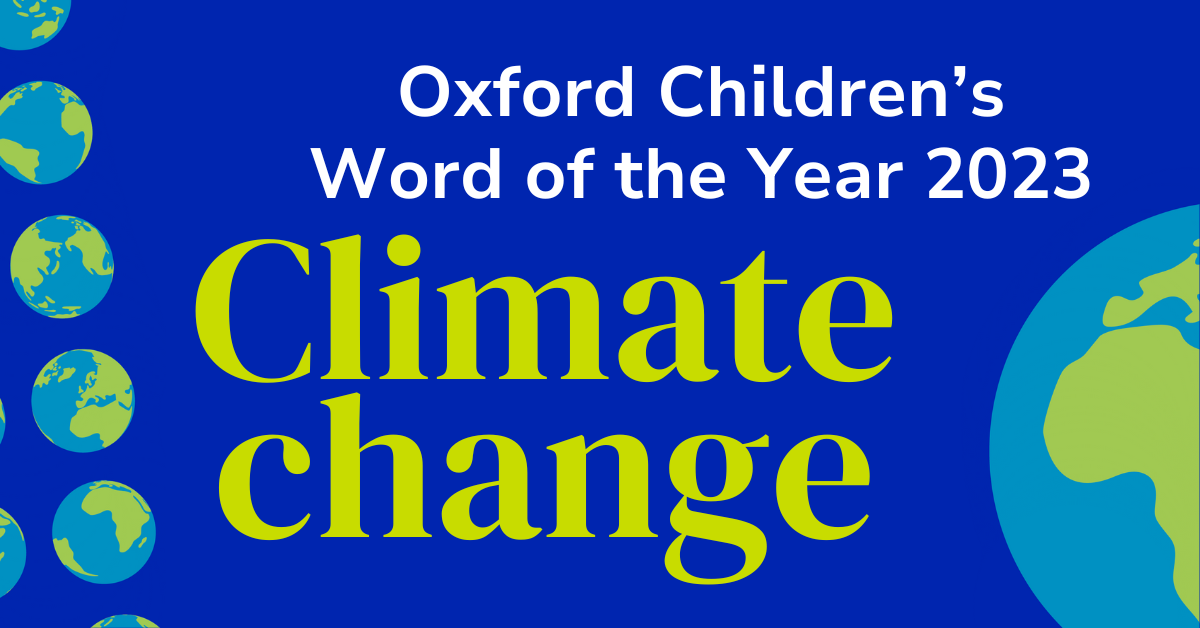Climate change is Children’s Word of the Year according to Oxford University Press (OUP). A third of children chose climate change (33 per cent) as their word of the year, narrowly followed by war (31 per cent) and almost a quarter choosing coronation (24 per cent).
The research, which surveyed opinions from over 5,000 children across the UK aged 6-14, revealed young people’s desire for action with emotive words such as ‘need’ and ‘important’ occurring frequently in their statements. Impact on the wider world, their current lives and the future were cited as the main reason for the word choice, whilst ‘sad’, ‘scared’ and ‘worried’ were the most common responses by young people when asked how the word makes them feel.
Why climate change was chosen by children
Analysis of the of the Oxford Children’s Corpus, the largest children’s English language database in the world containing over half a billion words, showed the topic of climate change is regularly written about by children. Studying the most recent addition to the Children’s Corpus, the stories submitted for the BBC 500 WORDS 2023 story competition, ‘stop’ is revealed as the most common word used in the context, underlining children’s resolve to alter the course of climate change.
The research also demonstrated the impact of current affairs on children’s language. Of those who selected war (31 per cent) as their preferred choice, more than one in ten (13 per cent) mentioned the ‘news’ when asked why. Almost a quarter (23 per cent) referenced the conflict in the Middle-East or the war between Russia and Ukraine as a reason. The crowning of King Charles III was another key event in current affairs which impacted children, with many citing ‘celebration’ in relation to almost a quarter (24 per cent) choosing the word coronation.
Helen Freeman, Director of Oxford Children’s, said: “This year marks the tenth year of Children’s Word of the Year, and over the decade we have seen the significant role current affairs plays for children’s language development. The choice of ‘climate change’ not only demonstrates how attuned children are to the news and their environment, but the research also reveals their willingness to engage with meaningful change. Whether it’s understanding how children use slang phrases or what word reflects the past year, it’s imperative we continue to support children’s language development so they have the means and vocabulary to express themselves.”
Amy Meek, CEO and co-founder of Kids Against Plastic, said: “Through our work with young people, we’ve seen first-hand how willing children are to learn and engage with topics like climate change, so we’re not surprised to see it selected as Children’s Word of the Year. Sometimes we greatly underestimate children’s abilities to understand complex issues, so it’s encouraging that this research shows children are engaged and understand the impacts of climate change. We also mustn’t ignore the findings from the language research which demonstrate young people’s desire for action. Young people not only recognise that climate change is an issue, but they’re also seeing the importance of tackling it. No-one will feel the negative effects of climate change more than the next generation – or the positive effects of the action we take against it now.”
Other findings revealed bro to be the top slang word chosen by 42 per cent of children followed by lol (24 per cent) and slay (17 per cent). Along with bro being used as an informal term to address friends, research found children also use it as a ‘positive politeness’ strategy to confirm solidarity with another person whilst expressing admonishment.
In response to the latest findings, the Children’s Language department at OUP have published the Oxford Children’s Word of the Year 2023 report, which will go live on the 16th January 2024 here.
